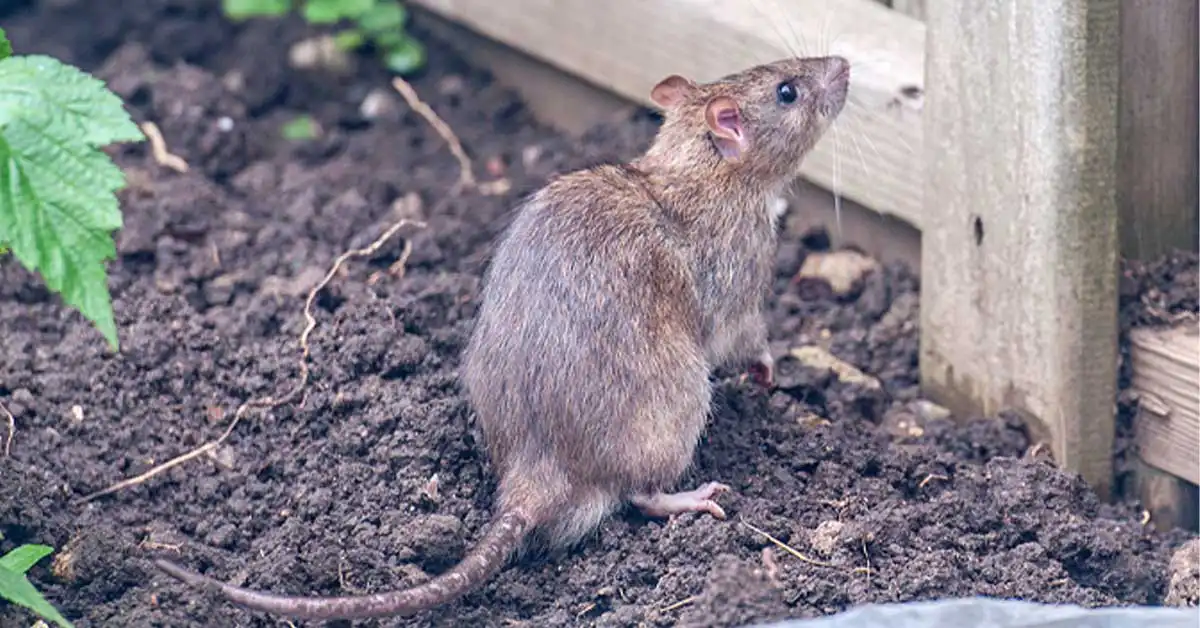
Spring weather means gardening for many Long Islanders. While most people recognize that some insects can be a bane to the garden as well as a blessing, they do not necessarily think of rodents. Yet rats and mice (as well as other rodents) are common garden residents.
Do Rats Burrow in Gardens?
Yes, rats dig homes (known as burrows) about one to six feet deep in gardens. Norway rats, which are commonly found on Long Island, are especially prone to burrowing in a garden.
In fact, gardens are prime locations for rats because they like fresh soil with food and water sources. Gardens provide all three necessary items.
What Do Rat Holes Look Like?
A rat hole will be about 2-4 inches wide. If the hole is newly excavated, fresh dirt will be around the entrance – usually in a fan-shaped pattern. If the rat hole is a little less new, the entrance will be smooth and compacted by the rats traveling the burrow.
The depth is another indicator because rat burrows tend to be 18 inches deep and about 3 feet long, on average. Rats can burrow deeper but tend to do so only when they are digging past a fence post, concrete slab, foundation, or similar structures.
Is It Okay to Have Mice or Rats in the Garden?
Having mice or rats in your garden may sound harmless or even cute, but it is not. Both mice and rats can carry parasites, mites, and diseases like jaundice, salmonellosis, cowpox virus, rat-bite fever, and trichinosis that can be serious.
Additionally, rats can damage your plants, bulbs, shed, wiring, and more. Some even dig into compost piles. Rat burrows are also a danger because they make openings for other vermin to invade your property and even your home.
Do Vegetable Gardens Attract Rats?
Absolutely! Fallen food and ripening produce alone make your garden extremely attractive to rats, mice, and other rodents. Since you water the garden, that also enhances the attraction as does a bird feeder.
How Do You Get Rid of Rats in the Garden?
Clearing rats from your garden takes a two-tier approach. The first phase, or tier, involves removing or diminishing the things that make your garden so attractive to rats. That includes:
- Switching to a rodent-proof composter/compost container.
- Storing birdseed in rodent-proof, sealable containers.
- Abstaining from feeding birds or wildlife.
- Do not store pet food outside.
- Do not feed your pets outside (or remove the leftovers as soon as they’re done).
- Dispose of all fecal matter quickly.
- Remove all fallen fruit and vegetables right away.
- Keep your garden neat/get rid of debris.
- Block rats’ access to the area under decking.
- If you have a second-floor deck, keep the area under it very neat.
- Remove water sources, fix dripping faucets, etc.
- Keep your firewood pile off the ground.
- Move things around regularly.
That last tip may sound odd, but rats are creatures of habit. They do not like change, or things that are new, so regularly moving around any outdoor furniture and such will contribute to creating a hostile environment for rats.
Keeping Rodents Away For Good
While all of that is essential to keeping rats out of your garden, once you have rat burrows in your garden, it probably will not be sufficient to make them leave. Once fully established on your property, you will likely need professional help like Arrow. DIY rat removal can be risky… especially if you have pets that go outdoors.
Once the rats are completely gone, the list of actions above can make sure that rats do not find your garden attractive in the future. Additionally, some gardeners will take the extra step of growing plants that rats do not like.
Plants known to deter rats and other rodents:
- Onions
- Garlic
- Rosemary
- Peppermint
- Marigolds
- Lavender
- Daffodils
- Oregano
- Cayenne
- Sage
- Black pepper
Tomatoes sometimes also end up on these lists. However, many gardeners swear they have evidence of rats eating tomatoes – so planting tomatoes as a rat deterrent is not conclusive.
Call the Rodent Experts at Arrow
If you have a rat or rodent problem, call in the professionals at Arrow. The sooner you contact us, the sooner we can help you live in a critter-free environment. To get started, contact Arrow Exterminating today.




